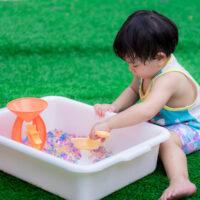Turning Struggles Into Cooperation
Parenting comes with its share of challenges, and moments of struggle with your child can feel overwhelming.
Find a group and register your child

Parenting comes with its share of challenges, and moments of struggle with your child can feel overwhelming.

Everyday life is full of opportunities to boost your child’s brain development in fun and meaningful ways.

Reading aloud to young children is one of the best ways to foster a love of reading, build language skills, and bond with your child.

One of the most challenging moments for any caregiver is when a child responds to a simple request with a firm “NO!” It’s a scene that quickly escalates as parents try to push for compliance while the child digs in even further.

When young children have a hard time expressing themselves verbally, their behavior often becomes their primary way to communicate.

Gary Chapman and Ross Campbell’s Five Love Languages of Children introduces a powerful approach to understanding how children give and receive love.

“Parenting Unplugged” encourages parents to minimize or eliminate screen time and digital distractions while spending time with their children.

A restful night’s sleep is important for young children, yet bedtime can often become a source of frustration for parents. If your child is having difficulty falling or staying asleep, several factors might contribute to their struggles.

The human brain is a powerful organ divided into two hemispheres, each with distinct roles. The left hemisphere handles logic, language, and analytical thinking, while the right hemisphere fosters creativity, intuition, and spatial awareness.

Children engage with the world in a hands-on way, using their senses to explore and make sense of their environment.